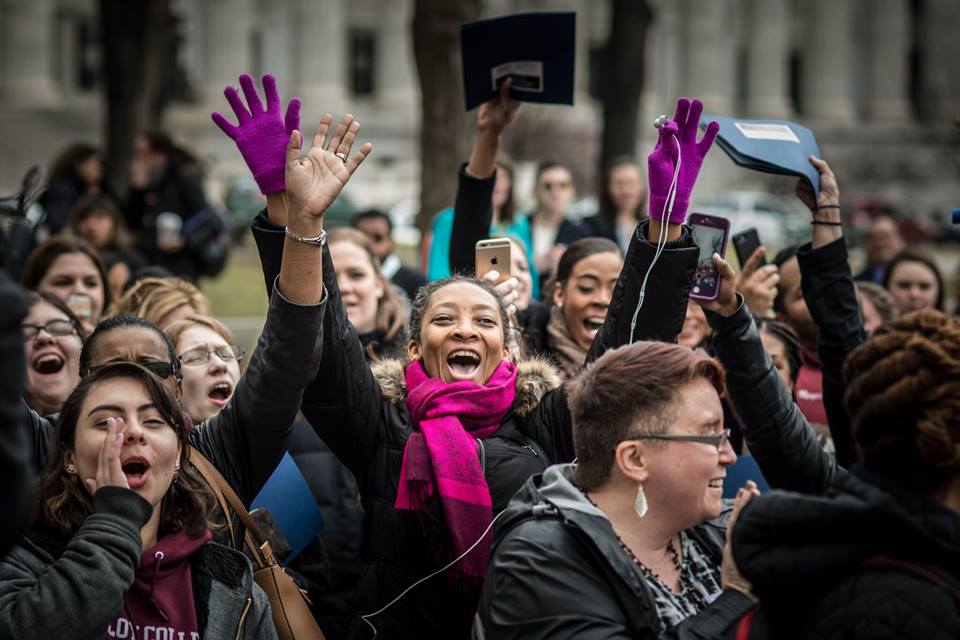Undergraduate Social Work

Earn a degree in Social Work and make a difference in a rewarding career.
The field of social work is experiencing a call for change like never before, and the demand for qualified professionals in the sector remains high. Now considered one of the fastest-growing careers in the country, the U.S. Bureau of Labor Statistics projects an average of 74,000 openings for social workers each year over the next decade.
With the chance to create meaningful change across various settings such as schools, mental health clinics, hospitals, child welfare agencies, human service organizations, and more, there’s never been a more promising time to embark on a gratifying career in social work. The National Association of Social Workers defines social work as “the helping profession”. Social workers examine the whole person (their behaviors, and how it relates to their environment).
Molloy University’s Undergraduate (Bachelor's) Degree in Social Work (BSW)
Molloy University’s Bachelor's Degree in Social Work (BSW) opens the doors to a range of diverse and fulfilling professions in social work. If you’re ready to be a part of a community that empowers change, advocates for social justice, and creates a lasting impact, you’re in the right place.
Molloy University’s unique program lets you earn your Bachelor of Social Work (BSW) and your Master of Social Work (MSW) in as little as five years by collaborating with Fordham University for the Master’s degree. You’ll graduate as a competent, values-based professional, capable of making a difference in the lives of others, as well as your own
Social Workers can be found in many different settings from health care, to schools, the justice system, and foster care — to name a few. Discover how our programs can support you in paving the way for a brighter future for yourself and others.

What Do Social Workers Do?
Social Workers can be found in many different settings from health care, to schools, the justice system, and foster care — to name a few. Discover how our programs can support you in paving the way for a brighter future for yourself and others.
All of our undergraduate degree programs in social work are designed to offer a transformative educational experience that equips you with the skills, values, and tools necessary to excel in such a dynamic field.
-
Types of Social Work to Specialize In
Mental Health and Clinical Social Work
Social workers are one of the nation's largest groups of providers of mental health. Those who specifically specialize in mental health and clinical social work offer families and individuals the therapeutic support needed to navigate and cope with challenging emotions, behaviors, and relationships.
School Social Work
School social workers aim to address the emotional, developmental, and educational needs of children. These professionals offer students and families tools including counseling, crisis interventions, and other community resources to create a healthy learning environment and support overall well-being.
Healthcare
Within the healthcare sector, social workers navigate diverse factors influencing health and wellness. These individuals contribute across the care spectrum from healthcare planning, policy, and administration to research and program development.
Justice and Corrections
Social workers engaged in justice and corrections serve in courts, police departments, probation agencies, and correctional facilities, working to reform lives within the justice system.
Addiction ServicesThose specializing in addiction services help individuals and families on the path to recovery. Through individual, group, and family counseling, these social workers restore hope and facilitate healing.
Child Welfare
Within the field of child welfare, social workers will often assess family situations, develop intervention plans, and collaborate with legal and community resources to advocate for children's rights and provide necessary support for at-risk families.
Aging
In the aging specialization, social workers connect older adults and caregivers to services that enhance different aspects of their lives, taking physical, social, psychological, and economic factors into account. They can assist in finding suitable housing, healthcare, and social activities, while also addressing age-specific challenges, including isolation and mental health concerns.
Public Welfare
Public welfare social workers engage with vulnerable populations, administering crucial benefit programs. Leaders in these settings train, supervise, and support staff to deliver effective services.
Advocacy and Community Organizing
Social workers champion the rights of individuals and communities, addressing the inequalities and disparities present in society through community-focused advocacy practice.
Administration and Management
This area of social work requires adept knowledge of social policy, human services, and program planning. In administration and management, social workers are proactive leaders in public and private agencies that provide services to clients.
Politics
Engaging with the political sphere, social workers contribute to advocacy and policy practices. Several local, state, and national elected officials hold social work degrees.
Research
Research-oriented social workers often possess advanced degrees that equip them with the tools required to contribute to the foundational framework of effective practice. They evaluate outcomes within human service organizations to shape and improve industry standards as needed.
-
Undergraduate Admissions Criteria
Admission to Molloy University requires a high school grade point average of 3.0 or higher. Specific entrance requirements include graduation from high school or equivalent with 20.5 units, comprising of:
- English - 4
- Foreign Language - 3
- Mathematics - 3
- Social Studies - 4
- Science - 3
If you’re home-schooled, you must obtain a letter from your local school district officials confirming that you’ve received a "substantially equivalent" education to district high school students or take and pass a Test Assessing Secondary Completion (TASC), formally known as a GED.
For a full scope of admissions requirements for our undergraduate studies, learn more here or contact the Office of Admissions.
-
Why Earn Your Degree in Social Work From Molloy University?
At Molloy, you’ll learn from experienced and distinguished faculty that combines academic excellence with real-world experience — so you feel prepared to take on your career in social work with confidence. Our educators are passionate about empowering the next generation of social work professionals by providing personalized attention and building meaningful relationships that extend beyond the classroom.
Consistently recognized as one of the top value institutions both nationally and regionally, Molloy University stands as one of the most cost-effective private universities within the New York and Long Island region. Plus, you’re only a train ride away from the city when you need a break from your studies.
-
Take the First Step Toward a Fulfilling Career
Ready to embark on a journey of growth, compassion, and empowerment? Your pathway to a rewarding career in social work begins at Molloy University. With high-quality programs across a spectrum of social work specialties and a commitment to your success, we empower students to make a lasting impact. Apply today to join a community of professionals dedicated to positive change and social justice.
Some of the many career outcomes for a Molloy degree in Social Work are:
- Benefits or employment specialist
- Child advocate or caseworker
- Family caseworker
- Foster care or adoption agent
- Hospice director
- Housing advocate
- Patient advocate
- Learning center director
- Outreach Coordinator
- Patient advocate
- Probation or parole officer
- Social worker
- Psychotherapist/Psychiatrist
- Rehabilitation or residential counselor
- Researcher
- Substance abuse counselor
- Youth services coordinator